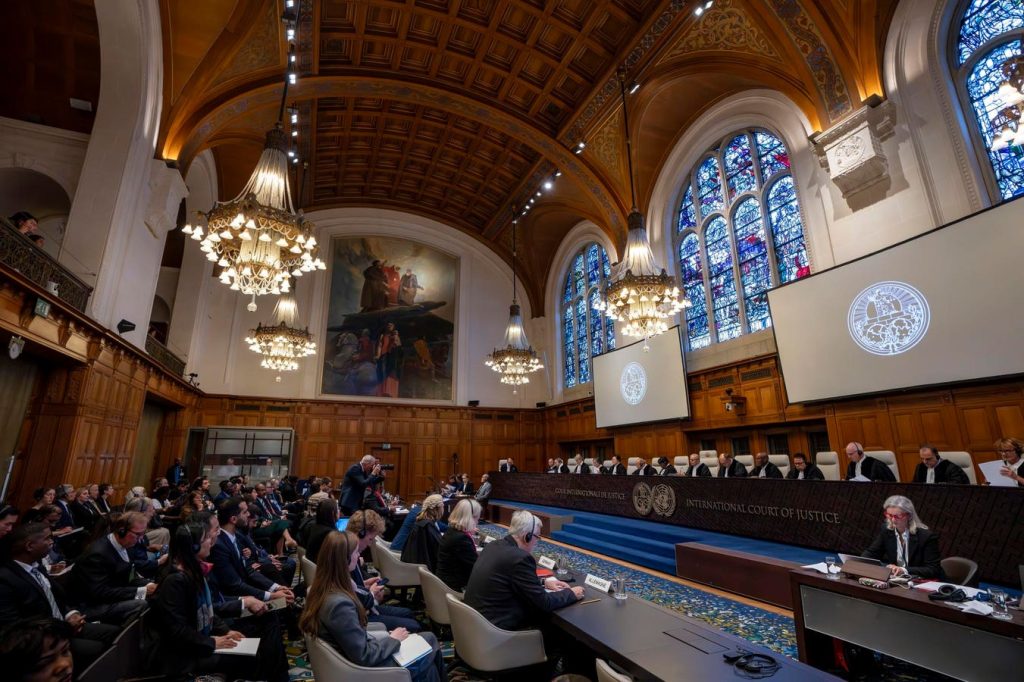The International Court of Justice (ICJ), also known as the World Court, recently concluded oral hearings concerning its forthcoming advisory opinion on states’ obligations regarding climate change. This advisory opinion, requested by the United Nations General Assembly (UNGA) at the behest of Vanuatu, seeks to clarify the legal responsibilities of nations in addressing climate change, including potential financial liabilities for their contributions to the problem and necessary actions for prevention. While the opinion will not be legally binding, it is anticipated to significantly influence future climate litigation and the development of climate-related laws. The hearings, held over two weeks in December 2023, saw over 100 countries and parties present their arguments, focusing primarily on the Paris Agreement and the obligations of countries to reduce greenhouse gas emissions. A key point of contention emerged regarding the responsibilities of fossil fuel-producing nations, particularly concerning whether they are obligated to reduce or cease production and eliminate subsidies.
The ICJ, established by the UN Charter in 1945, serves as a neutral forum for resolving legal disputes between states. Its fifteen judges, elected by the UNGA and UN Security Council for nine-year terms, represent diverse legal backgrounds and perspectives. The court’s advisory opinions, while not legally enforceable, carry significant weight in international law, offering authoritative interpretations that can guide future actions and legal developments. In the case of climate change, the ICJ’s advisory opinion is poised to shape the evolving landscape of climate-related litigation and international cooperation. The core of the debate centers around the interpretation and implications of the Paris Agreement, a landmark international accord aimed at limiting global warming.
The arguments presented before the ICJ reflected a wide range of perspectives on states’ obligations concerning fossil fuels and climate change. Some states, like the United States, argued that international law does not impose specific obligations on states regarding fossil fuel production or subsidies. Others, such as the United Kingdom, maintained that the Paris Agreement, through its mechanisms for updating nationally determined contributions (NDCs) based on global stocktaking, implicitly requires states to address fossil fuel production and subsidies in their climate action plans. The Russian Federation emphasized the focus on reducing emissions rather than combating sources, arguing that a state’s responsibility lies in reducing emissions within its territory regardless of the origin of the fossil fuels.
Several parties, particularly those representing vulnerable nations and regions, advocated for stronger action on fossil fuels. The Organisation of African, Caribbean and Pacific States (OACPS) argued that existing international law, including the duty of due diligence and the prevention principle, requires states to phase out fossil fuel production and related subsidies to prevent transboundary harm. They also invoked human rights law and the right to self-determination to support this position. Mexico emphasized the need for a just and equitable transition away from fossil fuels, particularly for developing countries, and highlighted the principle of Common but Differentiated Responsibilities and Respective Capabilities (CBDR-RC) to account for historical inequities and varying capacities.
Other states emphasized the principle of national sovereignty over natural resources. Kuwait argued that states have the right to exploit their natural resources and that there are no specific obligations under international law to limit or cease fossil fuel production. India echoed this sentiment, emphasizing the right to utilize natural resources for economic and social development and noting that the use of fossil fuels is a global phenomenon, not limited to producing states. Canada also highlighted the principle of permanent sovereignty over natural resources, asserting that the Paris Agreement allows each state to determine its own measures for meeting climate goals.
At the close of the hearings, several judges posed clarifying questions, reflecting the complexity of the issues at hand. Judge Sarah Cleveland of the United States specifically inquired about the legal obligations of states where fossil fuels are produced to ensure the protection of the climate system from greenhouse gas emissions, including the issue of subsidies. The responses to this question highlighted the divergent views among states, further underscoring the challenge of achieving a consensus on this contentious issue.
The varied responses to Judge Cleveland’s question demonstrate the deep divisions among states regarding the legal implications of fossil fuel production in the context of climate change. The United States and the European Union, for example, asserted that there are currently no specific legal obligations related to fossil fuel production subsidies. In contrast, the Commission of Small Island States on Climate Change and International Law (COSIS) argued that states have an obligation to transition away from fossil fuels based on the best available science. This divergence reflects the ongoing debate about the scope and nature of states’ responsibilities in addressing climate change, particularly concerning the role of fossil fuels.
Several countries emphasized nuanced positions, acknowledging the need to balance climate action with other considerations. The Bahamas, while recognizing the principle of states’ sovereignty in choosing their mitigation measures, argued that the current scientific consensus necessitates a substantial reduction in fossil fuel use. They cautioned against reliance on technologies like carbon capture and storage as a primary solution, advocating for a more fundamental shift away from fossil fuels. China, while arguing that the UNFCCC regime does not impose specific obligations on fossil fuel producers, also emphasized the principle of states’ sovereign rights to exploit their resources and the need to consider the unique challenges faced by countries heavily reliant on fossil fuels.
The hearings and the responses to Judge Cleveland’s question highlight the complex legal landscape surrounding climate change and fossil fuels. The ICJ’s advisory opinion, expected in the near future, will be a significant development in this area, potentially shaping the trajectory of future climate litigation and international negotiations. The contrasting viewpoints presented before the Court underscore the need for continued dialogue and cooperation among states to address the global challenge of climate change effectively.

